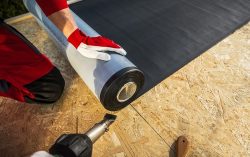Insulation in Commercial Roofing
May 19, 2023 8:34 pm Leave your thoughts Insulation in Commercial Roofing
Insulation in Commercial Roofing
Commercial roofing is incredibly important when it comes to protecting a building from the elements. Roofing provides shelter, but it also plays a significant role in energy efficiency. Insulation can make a huge difference in the performance of a commercial roof. Insulation helps to keep the building cool in the summer and warm during the winter months by maintaining indoor temperatures and reducing the need for extra heating and cooling. Let’s take a look at some of the most common types of commercial roofing insulation, along with their advantages and disadvantages.
1. Spray Foam
Spray foam insulation is a popular choice for commercial roofing projects. It is a two-part liquid that is mixed together and sprayed through a hose onto the roof. The foam quickly expands and hardens, sealing any cracks or gaps. It is incredibly durable and can last for up to 25 years, making it a long-lasting investment.
The insulation is also very effective at reducing energy costs. It seals the roof, preventing leaks and drafts, which means that the HVAC system doesn’t have to work as hard to maintain a comfortable temperature. Spray foam insulation is also resistant to moisture, which means that it won’t absorb water and cause damage to the roof.
2. Fiberglass
Fiberglass insulation is another popular choice for commercial roofing. It consists of small glass fibers that are woven together to create a matting material. The matting is then installed in between the roofing materials, such as the metal panels or shingles.
Fiberglass insulation is highly effective at reducing energy costs. It is also lightweight, easy to install, and resistant to moisture. It does not absorb water, which means that it won’t corrode or degrade over time. However, unlike spray foam insulation, fiberglass does allow for air movement, which means that drafts can still occur.
3. Cellulose
Cellulose insulation is made from recycled paper products that have been treated to become fire-resistant. It is installed as loose fill in between the roofing materials and is incredibly effective at reducing energy costs. It is also inexpensive and environmentally friendly.
However, cellulose insulation is not ideal for locations with high humidity. It can absorb moisture, which can cause it to clump together and lose effectiveness. Additionally, the loose fill can settle over time, which means that it will need to be periodically replaced or supplemented.
4. Mineral Wool
Mineral wool is made from volcanic rock and is highly effective at reducing energy costs. It is installed as batts or rolls in between the roofing materials and is especially well-suited for commercial roofs with low slopes. Mineral wool insulation is resistant to fire, moisture, and pests, and it can last for up to 50 years. It is also eco-friendly, as it is made from natural, renewable resources.
However, mineral wool requires special installation techniques to ensure that it is properly sealed and doesn’t permit air flow. This can make it more expensive to install than other types of insulation.
Regardless of which type of insulation you choose for your commercial roof, it is important to work with a professional roofing contractor who can help you determine the best solution for your building. Insulation plays a critical role in the performance of a commercial roof, and choosing the right type can save you a great deal of money in the long run.
However, choosing the right insulation type is just the first step. The insulation must be installed correctly to ensure maximum effectiveness. A professional roofing contractor can help guarantee that the insulation is installed to the right specifications, ensuring the best possible energy savings and protection for your commercial roof. In addition to proper installation, routine maintenance and inspections can help extend the life of your commercial roof and its insulation, ultimately saving you money in the long-term.
Final Thoughts
Insulation is a vital component of any commercial roofing system. It keeps buildings comfortable, reduces energy consumption, and ultimately saves money in the long run. When choosing an insulation type, it is important to consider factors such as performance, durability, resistance to moisture, and installation costs. Working with a professional contractor is the best way to ensure that your commercial roof and insulation are installed correctly and maintained over time, ensuring maximum performance and efficiency for years to come.
For commercial, industrial and residential roofing systems you can count on, there’s no one better in the business than R & H Roofing. With an unparalleled level of expertise and top-tier products from industry-best brands, we offer new roofing, roof repairs and roof evaluations for your complete peace of mind. Call us today for a free consultation! See site for more info: https://rhroofing.org/
Categorised in: Commercial Roofing
This post was written by admin
